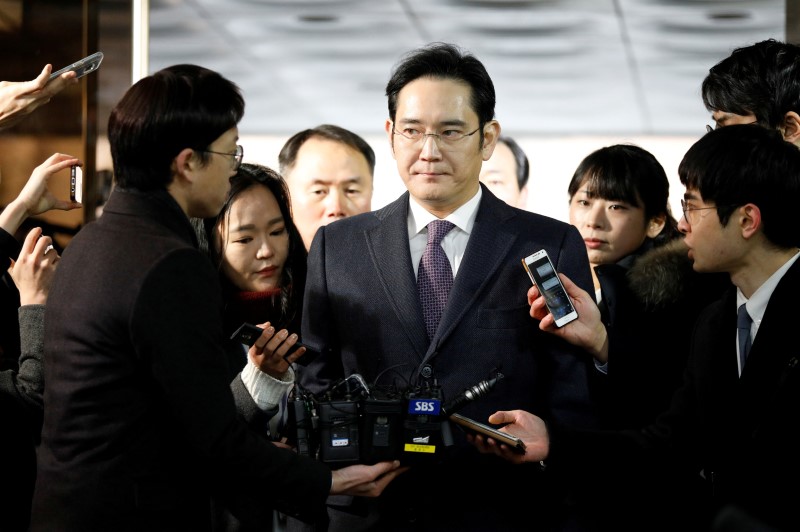By Heekyong Yang and Yuna Park
SEOUL (Reuters) - South Korean regulators turned up the heat on Samsung Group (SAGR.UL) over its complex ownership structure, with the country's antitrust chief saying on Thursday the arrangement for control at the nation's top conglomerate was "not sustainable".
Samsung Group is controlled through a web of circular shareholdings between companies such as Samsung C&T, Samsung Life Insurance, and Samsung Electronics (KS:005930).
Critics have said the structure has enabled the family of Samsung heir Jay Y. Lee to retain control of the companies in the conglomerate, especially crown jewel Samsung Electronics, with minimum investments.
"The clear fact is, the current ownership and control structure of Samsung Group, which goes from Vice Chairman Jay Y. Lee to Samsung C&T to Samsung Life Insurance to Samsung Electronics, is not sustainable," Kim Sang-jo, chairman of the Korea Fair Trade Commission, told reporters on the sidelines of a meeting with business leaders.
Circular shareholdings have been common among Korea's powerful family-controlled conglomerates, or chaebols, who have faced growing calls for reform from the government and investors.
Kim is popularly known as the "chaebol sniper" for his shareholder activist campaigns before joining the Commission. He has often criticized chaebols for their complicated cross-shareholding structures that he has said are aimed at cementing family control.
In 2016, as part of an activist group, Kim had suggested Samsung Group could resolve its complex structure by first setting up a financial holding company centered around Samsung Life Insurance, and by then forming a holding company centered around Samsung Electronics.
Kim said on Thursday he is urging Jay Y. Lee to make a decision concerning the ownership structure, adding that Samsung Electronics Vice Chairman Yoon Boo-keun, who attended the meeting, had told him it will be considered.
A Samsung Electronics spokesman did not have an immediate comment.
Samsung Group has come for criticism earlier too, most notably from U.S. activist hedge fund Elliott Management, which proposed as a solution in 2016 that Samsung Electronics split itself into two.
Samsung Electronics rejected that proposal but accepted part of the fund's proposals by announcing plans to cancel its existing treasury shares worth over $35 billion by 2018.
Others have also questioned the group's ownership structure recently.
The country's top financial regulator said on Wednesday that Samsung Life Insurance must consider ways to lessen the risk of having too much of its assets concentrated in one place, including selling some or all of Samsung Life's stake in Samsung Electronics.
"Lessening the risk of concentrated assets is key to securing financial stability, which is what we are interested in," said Choi Jong-ku, Chairman of the Financial Services Commission.
"If there are any concerns about retaining management control (of Samsung Electronics), we are saying, look for ways to keep it while lessening the risk."

Samsung Life Insurance is at the heart of a cross-shareholding structure in which it owns about 8 percent of Samsung Electronics, which has a market value of about $340 billion, according to Thomson Reuters data.